Dispelling schizophrenia myths: fact-checking and debunking report

According to the World Health Organization (WHO), schizophrenia affects approximately 24 million people worldwide, which is about 1 in 300 people or 0.32%. This rate increases to 1 in 222, or 0.45%, among adults.1 In Italy, around 245,000 people suffer from this disorder.2 This condition occurs in similar percentages in men and women, although it tends to manifest later in life in women.2 Generally, schizophrenia appears between the ages of 18 and 28.2 Its onset can be sudden or preceded by a period during which the person becomes withdrawn, shows less interest in the surrounding world, distances themselves from friends and partners without reason, and loses their job or drops out of school.2
It’s important to recognize the symptoms of schizophrenia and seek help as early as possible. A person experiencing psychotic symptoms often has disrupted thoughts and perceptions, and they may have difficulty recognizing what is real and what is not.3 Schizophrenia symptoms can differ from person to person.3
Symptoms fall into three categories3:
- Positive: hallucinations (when a person sees, hears, smells, tastes, or feels things that are not actually there), delusions (when a person has strong beliefs that are not true and may seem irrational to others), and thought disorder (when a person has ways of thinking that are unusual or illogical);
- Negative: include loss of motivation, loss of interest or enjoyment in daily activities, withdrawal from social life, difficulty showing emotions and difficulty functioning normally;
- Cognitive: include problems in attention, concentration, and memory.3
People with schizophrenia often experience cognitive difficulties, such as issues with memory, attention, and problem-solving skills.1 However, in individuals with schizophrenia the incidence of psychotic symptoms often decreases with age.3
The causes of schizophrenia are not yet well understood, but it is believed to result from multiple factors,2 including psychosocial elements that can impact the onset and course of the condition.1
Available treatments primarily focus on reducing symptoms,4 considering that some people may experience periodic phases of symptom exacerbation and remission throughout their lives, while others may face a gradual worsening of symptoms.1
References
Shedding light on misconceptions
Stigma, discrimination, and human rights violations are common for people suffering from schizophrenia.1 Recent publications have highlighted that stigma affects about 37% of people with schizophrenia spectrum disorders.2
Indeed, the diagnosis is often associated with negative stereotypes, and individuals with schizophrenia experience more stigma compared to those with other mental illnesses.2
Despite efforts to reduce stigma, the stigma related to schizophrenia has increased in recent decades.2 A 2022 survey indicated that stigma surrounding acute episodes of schizophrenia is rising, in contrast to depression, which has seen a reduction in stigma.3 In people with schizophrenia, stigma is significantly associated with depressive symptoms, impaired mental functioning, and reduced quality of life, and it occurs already in the early stages of diagnosis or even at a preclinical level.2
 The survey1
The survey1
Google Trends was used to verify the globally relevant topics on schizophrenia most frequently searched on Google. A preliminary survey was conducted to observe long-term public interest from 2004 to the present. Over the 20 years of data collected by Google, public inquiries about schizophrenia have remained fairly constant, with a slight decline between 2008 and 2016. To detect more current social phenomena in information requests, the focus narrowed to the past five years, from 2019 to the present. In addition to the signals detected through Google’s tools, information was gathered from the communication channels of various international institutions committed to ensuring the dissemination of accurate and authoritative news. These include the WHO Newsroom and the National Institute of Mental Health in the United States.
References
- Google Trends (n.d.). "schizophrenia dissociation, schizophrenia violence, schizophrenia heredity, schizophrenia hospitalization, schizophrenia smart". Retrieved February 7, 2024
Recommendations from well-known debunking associations worldwide were also observed, particularly FactChecker.it.
Regarding schizophrenia, public inquiries mainly focused on five areas:
- Symptoms of the disease and how to recognize it;
- Definitions of the disease;
- Types of the disease (paranoid schizophrenia) and related disorders (bipolar disorder, depressive disorder, and other psychotic disorders);
- Possible treatments;
- Causes of the condition.
Choosing the “fact-checking” topics
The volume of questions submitted to Google for each of the most searched topics over the last five years was evaluated to define the most searched facts on the web. The result of this survey revealed that the topic of violence associated with schizophrenia was the most searched subject, followed by searches on schizophrenia and dissociative identity disorder and the effects of schizophrenia on motor skills. Finally, topics related to whether schizophrenia is hereditary and hospitalisations due to schizophrenia garnered equal interest [Fig.1].
Topics or queries searched by users in the last five years regarding schizophrenia:
[Blue: Schizophrenia and dissociative identity disorder; Red: Schizophrenia and violence; Yellow: Schizophrenia and heritability; Green: Schizophrenia and hospitalisations; Purple: Schizophrenia and abilities]

References
- WHO – Schizophrenia
- Mendonca M. et al., Ultra-high risk for psychosis stigma: an updated systematic review. Brazilian Journal of Psychiatry (2023); doi: 10.47626/1516-4446-2023-3385
- Schomerus G. et al., Changes in mental illness stigma over 30 years – Improvement, persistence, or deterioration? European Psychiatry (2022); 65(1), e78,1-7
Misconceptions to clarify that registered the highest search volumes are:
- PEOPLE WITH SCHIZOPHRENIA ARE AGGRESSIVE OR DANGEROUS
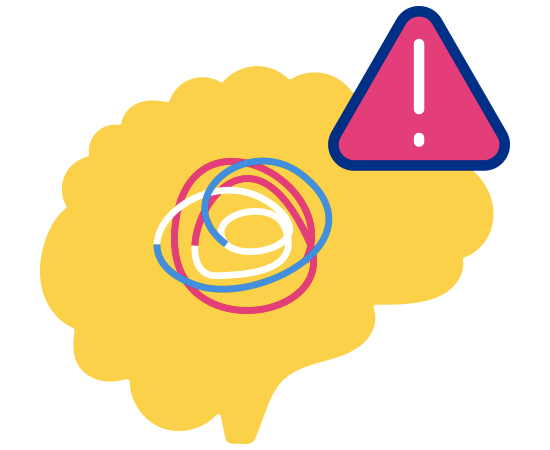
Due to distorted portrayals in films,1 it is a common belief that people with schizophrenia are violent, either due to the psychopathological symptoms of the condition or as a result of substance abuse, which is a recognised risk factor for violent acts.2 However, evidence suggests otherwise:
- The majority of people with schizophrenia are not violent.3 Some studies have shown that only 3-5% of violent acts can be attributed to individuals with psychiatric disorders.4
- The risk of violence by people with schizophrenia increases in cases where there is concurrent substance abuse.2
- Among people with schizophrenia, the risk of self-harm or acts of violence towards others is higher when the condition is not treated.3
- Overall, people with schizophrenia are more likely to be victims of violence than those without the condition, with estimates suggesting a tenfold increase in risk.4
References:
- Owen P. Dispelling myths about schizophrenia using film. Journal of Applied Socia Psychology (2007); 37(1):60-75
- Fazel S. et al., Schizophrenia, substance abuse, and violent crime. JAMA (2009); 301(19);2016-2023
- National Institute of Mental Health - Schizophrenia
- ISS. Falsi miti e bufale. I malati di mente sono tutti pericolosi?
- SCHIZOPHRENIA IS CHARACTERISED BY A SPLIT PERSONALITY
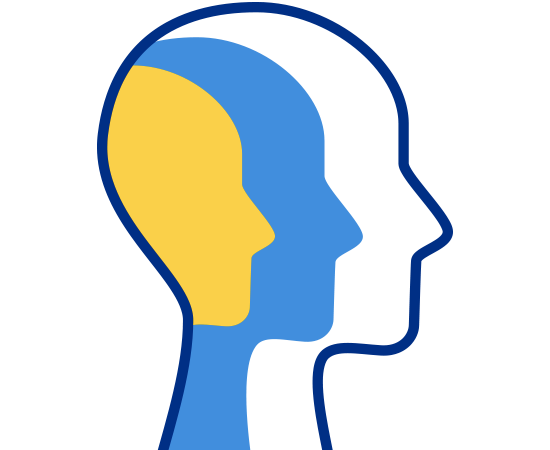
Bizarre and disorganized behaviour and the inability to organise thoughts logically are symptoms of schizophrenia that can lead to the misconception that individuals with this condition experience a split personality. However, it is important to remember that:
- Schizophrenia alters the way a person thinks and behaves. Individuals with this condition seem to lose touch with reality2 but do not have altered self-perception.
- In contrast, people with dissociative identity disorder have two or more distinct identities that alternately control their behaviour.2
- Although some characteristics of dissociative identity disorder may appear similar, schizophrenia is not equivalent to this condition, also known as "multiple personality disorder."
References:
- HALLUCINATIONS AND DELUSIONS MAKE IT IMPOSSIBLE TO LIVE A NORMAL LIFE
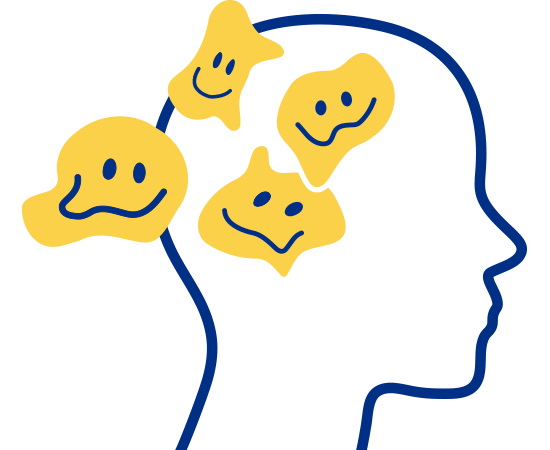
Hallucinations occur in a variety of psychiatric disorders and can even be part of the everyday experiences of people who do not meet the diagnostic criteria for mental illnesses.1 However, for individuals with schizophrenia:
- Over time, the percentage of people with schizophrenia who are able to live independently increases.2
- Pharmacological treatment and psychological support can help many individuals with schizophrenia lead productive and fulfilling lives.3
- After achieving symptom control, various therapies continue to help people in managing the illness and improving their lives.3
References:
- Waters F. and Fernyhough C. Hallucinations: A systematic review of points of similarity and difference across diagnostic classes.
Schizophrenia Bulletin (2016); 43(1):32-43 - Drake E. R. et al., A 16-year follow-up of patients with serious mental illness and co-occurring substance use disorder.
World Psychiatry (2020); 19(3):397-398
- SCHIZOPHRENIA IS CAUSED BY HEREDITARY FACTORS
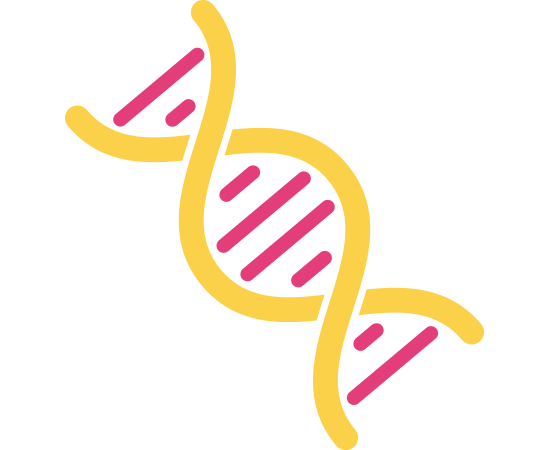
The causes of schizophrenia remain uncertain. Most experts believe that schizophrenia does not have a single cause but rather results from a combination of factors.1 Among the verified hypotheses about the causes of schizophrenia are:
- Schizophrenia sometimes runs in families. However, this does not mean that if one family member has schizophrenia, other family members will necessarily develop the condition.2
- Many genes have been associated with a potential onset of schizophrenia, but no single gene is linked to the condition.2
- Stressful life events can play a role in triggering symptoms and influencing their course.3
- A range of factors, such as adverse events or traumas occurring at birth, can affect mental balance with possible long-term consequences.1
- Heavy use of certain drugs can be a triggering event that may contribute to the onset of schizophrenia in predisposed individuals.1
- At the brain level, people with schizophrenia may have differences in certain areas and their connections.2
References:
- THERE ARE NO EFFECTIVE TREATMENTS FOR SCHIZOPHRENIA
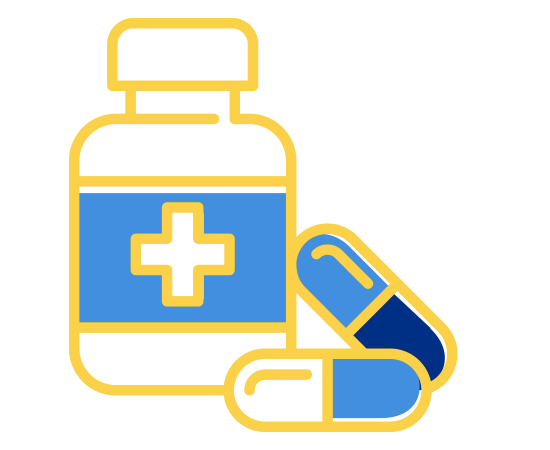
Although there is no cure for schizophrenia, research has led to innovative and safe treatments for managing symptoms.1 It can be stated that:
- There is a wide range of therapeutic options for people with schizophrenia, including medications, psychological interventions, family interventions, cognitive-behavioural therapy, and psychosocial rehabilitation.2
- Patients, families, and specialists must be aware that many people with schizophrenia have a favourable course and that each individual has many resources that should be recognised and supported.1
References:
- THE ONLY OPTION FOR PEOPLE WITH SCHIZOPHRENIA IS HOSPITALISATION IN DEDICATED FACILITIES
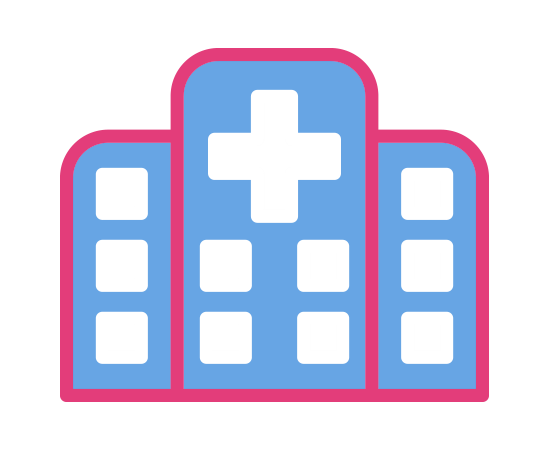
Although one-third of people with schizophrenia experience hospitalisation in dedicated facilities within the first two years of treatment, this event can be traumatic for individuals experiencing a first episode of psychosis.1 In fact:
- The majority of people with schizophrenia live with their families, alone, or in shared housing.2 Therefore, the belief that individuals with schizophrenia are frequently hospitalised in dedicated facilities is a misconception.2
- The need for hospitalization in dedicated facilities can be reduced by shortening the length of the first hospitalisation, minimising residual symptoms, and increasing medication adherence.1
- Current treatments for schizophrenia focus on helping people manage symptoms, improve daily life, and achieve goals such as completing education, pursuing a career, and maintaining stable relationships.3
References:
- Robinson D. G. et al., Predictors of hospitalization with individuals with first-episode psychosis: data from a two-year follow-up in the RAISE-ETP Study.
Psychiatric Services (2019); 70(7):569-577 - American Psychiatric Association What is Schizophrenia?
- National Institute of Mental Health. Schizophrenia
